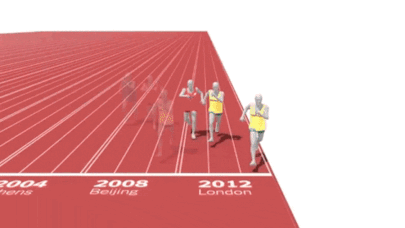Law Of Increasing Learning: Why Being Great Is So Much Harder Than People Realize
Author’s Note: This article was written over 60 hours with love and care using the blockbuster mental model.
This fascinating New York Times video changed the way I think about career success.
It shows the world records in the men’s 100-meter sprint between 1896 and 2012. Notice anything interesting?
There’s almost a straight line of improvement over time.
Now, if you have any curiosity about how the world works, you have to ask yourself,
What’s going on here? What does this say about how greatness is achieved?
In this article, I make the case that what we’re seeing here is a pattern that happens across almost all fields and industries: The amount to learn in order to be great is increasing exponentially.
Copy Best Practices. To get a quick start, competitors first copy the best practices of the top performers.
Experiment. Once they hit the best practice frontier, they then focus on experimentation.
Solidify New Best Practices. Most experiments fail, but the ones that succeed become best practices and are copied by others. The body of knowledge that one must master in order to be great increases.
Respond To Creative Destruction. Occasionally, completely new paradigms arise where large bundles of old best practices become obsolete and early adopters opportunistically create a bundle of new practices that create a new paradigm. Many great tech entrepreneurs have been able to succeed at a young age by devoting years of deliberate learning to a new field before anybody else.
Ultimately, the process repeats itself…
The history of running backs this up. Throughout the period when world records were improving, so too were the training paradigms: from intensity training to interval training to a focus on endurance. Each generation built upon the previous generation’s lessons and built new paradigms for training, technique, equipment, and health. Or as Isaac Newton eloquently said:
If I have seen further than others, it is by standing upon the shoulders of giants.
Running is a microcosm of what’s happening in the work world as knowledge explodes (social media content is doubling every year, digital information is increasing tenfold every five years, academic research is doubling every nine years). This explosion creates exponentially more “best practices” for us to build upon if we want to be great.
We must also learn more because our existing knowledge is becoming obsolete at a faster and faster rate. One academic study, for example, found that the decay rate in the accuracy of clinical knowledge about cirrhosis and hepatitis was 45 years. In other words, if you’re talking to a 70-year-old liver specialist who hasn’t updated his skills, you have a 50 percent chance of getting bad information. Engineering degrees went from a half-life of 35 years in 1930 to about 10 years in 1960.
The explosion of knowledge and the corresponding decay make one thing clear: we need to put a bigger priority on constant learning—as big an emphasis as we put on getting our optimal daily dose of nutrients, exercise, and sleep.
The Law Of Accelerating Learning
According to Our World In Data, the average person in developed societies has been spending more and more time learning in formal settings over the last two centuries.
The same holds true with informal learning outside of traditional institutions, which accounts for 70 to 90 percent of all learning. Podcasts, videos, articles, games, and digital courses give people the ability to learn almost anything online for free.
A similar trend is happening with intelligence. One of the most surprising trends in psychology is called the Flynn Effect. It shows how intelligence test scores, which historically have been thought of as “fixed,” have continued to rise in many parts of the world over the past century.
Why is this all happening? I’d argue that the reason is what I call the Law of Accelerated Intelligence:
As our amount of accumulated knowledge increases exponentially, the minimum amount of learning we need to do in order to productively participate or be a top performer in society increases. In other words, accelerated societal change necessitates accelerated intelligence.
Or as economist Ben Jones puts it:
If one is to stand on the shoulders of giants, one must first climb up their backs, and the greater the body of knowledge, the harder this climb becomes.
We’ve already felt this in our own daily lives too. When I first learned web design, all I needed to know was HTML and how to use Adobe Photoshop. Now, a web designer is expected to understand other languages too, understand how to do testing and analytics, and how to use a huge suite of other tools. And whether your career is web design, sales, journalism, or real estate, the digital world generates dozens of new skills to master.
For example, data science, programming, and artificial intelligence used to be niche skills. Now, having a basic understanding of them is more and more important for more and more professions. It’s no longer enough to just get a degree or take a professional development course once a year. The learning needs to be constant.
Just like with running, being among the best gets more and more demanding with each passing year. Each generation of champions develops a body of best practices. The next generation must learn them and then build upon them, leaving those who come after them with even more to learn to get up to speed. And the cycle continues.
Granted, the process of creative destruction where new industries and fields form provides windows of opportunity where people with new, important knowledge can leapfrog others with more overall experience. Many great tech entrepreneurs have been able to succeed at a young age by devoting years of deliberate learning to a new field before anybody else. But, their success doesn’t mean that they can slow down their own learning. In fact, it often means that they need to speed it up.






